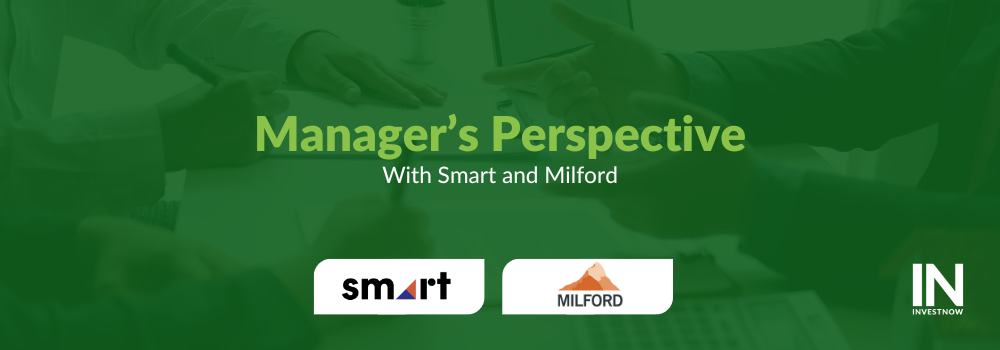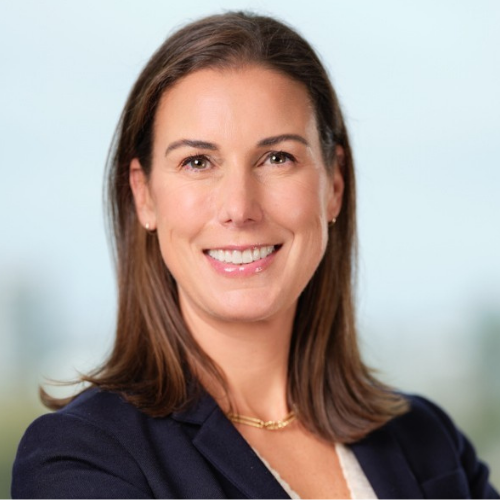
KiwiSaver Trends | Navigating Growth, Fees and Ethical Priorities
Welcome to the September 2025 Manager’s Perspective. Each month, InvestNow invites our investment managers to discuss our monthly theme. This month, we asked Smart and Milford some questions to help you better understand their investment styles, strategies, and perspectives on current KiwiSaver trends. Read the questions and their responses below.
Catherine Pollock
GM Business Development & Distribution
Smart

SuperLife together with Smart, helping Kiwis grow their wealth since 1996.
Smartshares Limited (Smart) is the issuer and manager of the Smart Exchange Traded Funds, SuperLife Invest and the SuperLife KiwiSaver Scheme. The InvestNow Smart Growth Fund in the InvestNow KiwiSaver Scheme (managed by FundRock NZ Limited) invests in the SuperLife Growth Fund in SuperLife Invest.

Q1: KiwiSaver providers have seen a clear shift toward higher growth funds – what’s driving this move, and do you expect it to continue?
KiwiSaver has made all Kiwis ‘investors’ and with that comes a greater awareness and willingness to take on risk, where appropriate. As balances grow, people are paying more attention and recognising the impact that fund choice has on long-term returns.
There’s also a broader understanding now that higher growth funds, while more volatile in the short term, have historically delivered stronger returns over the long run. Many members are becoming more comfortable with this risk/return trade-off, particularly as they see the difference in outcomes among peers and family. A friend of mine told me recently she finally changed her KiwiSaver from a balanced fund to a high growth fund after seeing her husband’s balance grow much faster than hers.
We expect this trend to continue, especially among younger members with a longer time horizon. At the same time, it is important that people choose funds that match their circumstances, risk appetite, and stage of life.
Q2: A recent InvestNow and Informed Investor survey showed that low fees were a top factor for respondents choosing a KiwiSaver provider. How should an investor weigh the importance of fees against other factors like performance, service, and ethical investing? Is there a point where focusing solely on fees becomes detrimental?
Low fees are important, however they are one piece of the pie. Focusing only on fees can come at the expense of other things that really matter – like after-fee performance, having investment options that align with your values and stage of life, and customer service.
Most of us will be invested in KiwiSaver for a long time, meaning it’s important to think about whether your KiwiSaver provider offers what’s important to you. After-fee performance is what is going to feed you in your retirement, but being able to easily engage with your account in a way that suits you is also important. This may mean having investment choices that suit your interests and stage of life, or simply knowing there is a friendly voice at the end of the phone and a helpful website that could make stressful times easier.
We are proud that in Canstar’s 2025 KiwiSaver Awards, the SuperLife KiwiSaver Scheme was named an Outstanding Value KiwiSaver Scheme, earning a 5-star seal of approval from Canstar’s expert financial research team in terms of price, performance and features.
Alongside the scheme-wide award, several funds in the SuperLife KiwiSaver scheme also received individual 5-star ratings. This year, the Ethica Fund (in the Balanced category) and the SuperLife Conservative Fund were both awarded 5 stars – a reflection of the value they deliver for investors seeking balanced or conservative options.
Q3: Our survey also revealed a disconnect – only 12% chose a provider based on ethics, yet 61% said ethical considerations were important to them. Why do you think this gap exists, and what can investors and/or fund managers do to help close this gap?
It’s understandable that there is a gap between what people say matters to them and the decisions they actually make. Choosing a KiwiSaver provider isn’t about one factor alone – ethics, performance, fees, and service all need to stack up together. Managers promoting their ethical investments must also have good performance, fees, and service.
Another challenge is that ‘ethical investing’ means different things to different people. For one person it might be climate change, for another it’s animal welfare, and for someone else it could be how companies are treating their employees. With a broad spectrum of values, it can be hard for investors to find a provider that feels like the perfect match.
Fund managers have a role to play in making ethical considerations in their funds more transparent and easier to understand. The more clarity and consistency we can provide, the easier it will be for investors to align their KiwiSaver with their personal values – without feeling like they have to sacrifice other important factors like returns or service.
The SuperLife KiwiSaver Scheme lets you set your own investment strategy from over 40 funds. You decide the mix of funds with growth and income investments, plus you can include funds like the SuperLife Ethica Fund, which is a balanced fund which integrates ESG through SRI exclusions and systematic ESG screening as set out in our Responsible Investment Policy here.
Disclaimer: SuperLife KiwiSaver scheme – The SuperLife KiwiSaver scheme is issued by Smartshares Limited (Smart). The Product Disclosure Statement is available at superlife.co.nz/legal.
Kady Buchanan
Head of Intermediary Clients
Milford


Q1: KiwiSaver providers have seen a clear shift toward higher growth funds – what’s driving this move, and do you expect it to continue?
At Milford, we’ve certainly seen this trend firsthand – the percentage of investments into our KiwiSaver Aggressive Fund has doubled over the past three years as more KiwiSaver members are rethinking how they invest. This shift isn’t just about chasing returns; it’s about growing confidence, deeper engagement, and a stronger understanding of how fund choice can shape future outcomes.
KiwiSaver has come of age and so have its members. With the scheme now 18 years old, New Zealanders are more financially confident and curious. Digital tools and independent advice are helping people see the real impact of their fund choices – not just in theory, but in projected retirement outcomes. Independent financial advisers are also helping guide investors toward funds that reflect their goals, timelines, and values, and the days of “set and forget” are fading fast.
At the same time, providers are upping their game. Fierce competition has not only given investors considerable choice, but it has sparked a wave of innovation in investor education and transparency. People are no longer blindly parked in conservative funds – they’re asking questions, comparing options, and making active decisions about where their money goes.
Demographics are also playing their part. The average KiwiSaver member is now in their late 30s to early 40s – a prime stage for embracing growth strategies. Investors are increasingly comfortable with the idea that short-term volatility is the price of long-term potential.
And then there’s the market. With stronger returns from equity markets (e.g. the Nasdaq surging nearly 70% over the past two years), many higher growth funds – typically light on fixed income – have delivered eye-catching returns. That kind of performance is hard to ignore, and it’s reinforcing the appeal of higher-risk, higher-reward strategies.
With investors more informed, engaged, and future-focused than ever, the shift toward growth funds isn’t just a trend – it’s becoming the new norm.
Q2: A recent InvestNow and Informed Investor survey showed that low fees were a top factor for respondents choosing a KiwiSaver provider. How should an investor weigh the importance of fees against other factors like performance and service, and is there a point where focusing solely on fees becomes detrimental?
Low fees are often a factor when investors compare KiwiSaver providers. However, focusing solely on fees can be short-sighted if it means overlooking other critical factors like net performance and service.
Fees should always be considered in context. In strong markets, passive funds with low fees may perform well simply by riding the wave. But when volatility hits – or markets face a shock – active managers with potentially higher fees may have more tools at their disposal to preserve capital and manage downside risk. That ability to respond, rather than simply track the market, can make a meaningful difference over time.
Service also matters. Investors should ask: can I speak to someone if I have a question? Is the app or online portal easy to use? Am I kept informed about what’s happening in the markets and how it affects my investments? These touchpoints can shape the overall experience and confidence in a provider.
In short, fees are a factor – but they’re just one piece of the puzzle. A well-rounded decision should weigh cost against capability, net of fee performance, service, and values. Otherwise, chasing the lowest fee could come at the expense of long-term outcomes.
Q3: Our survey also revealed a disconnect – only 12% chose a provider based on ethics, yet 61% said ethical considerations were important to them. Why do you think this gap exists, and what can investors and/or fund managers do to help close this gap?
Most investors want their money to “do good” – whether that’s through avoiding industries linked to societal harm or pushing capital toward innovative solutions. At the same time, they want strong returns. So while ethical investing clearly matters to many, the gap between values and provider choice may reflect how complex and nuanced this space really is.
Just because a provider doesn’t market itself as “ethical” doesn’t mean it’s not doing the work. Many fund managers are quietly embedding responsible practices into their investment process – through exclusions, engagement, and proxy voting. Investors may be learning to read between the lines, recognising that meaningful change often happens behind the scenes, not just through bold labels.
There’s also a trade-off to consider. Purely ethical funds often exclude entire sectors, which can limit diversification and reduce opportunities to influence change from within. Companies listen to regulators, customers, and investors – and having a seat at the table as an investor can be a powerful way to drive better behaviour. Sometimes, investing in a company and engaging with it can be more impactful than avoiding it altogether.
To close the gap, fund managers need to be clearer and more transparent about how values are woven into their investment decisions – not just in marketing, but in action. And investors need to feel confident that they don’t have to choose between doing good and doing well. When values and performance are both visible, alignment becomes easier – and more powerful.
Disclaimer: This article is intended to provide you with general information only. It does not take into account your objectives, financial situation or needs. Milford Funds Limited is the issuer of the Milford KiwiSaver Plan and Milford Investment Funds. Please read the relevant Milford Product Disclosure Statement at milfordasset.com. Before investing you may wish to seek financial advice. Past performance is not a reliable indicator of future performance.
Disclaimer
The following commentaries represent only the opinions of the authors. Any views expressed are provided for information purposes only and should not be construed in any way as an offer, an endorsement or inducement to invest. All material presented is believed to be reliable but we cannot attest to its accuracy. Opinions expressed in these reports may change without prior notice.
This article is made available by InvestNow Savings and Investment Service Limited (“InvestNow”). The information and any opinions in this publication are based on sources that InvestNow believes are reliable and accurate. InvestNow, its directors, officers and employees make no representations or warranties of any kind as to the accuracy or completeness of the information contained in this publication and disclaim liability for any loss, damage, cost or expense that may arise from any reliance on the information or any opinions, conclusions or recommendations contained in it, whether that loss or damage is caused by any fault or negligence on the part of InvestNow, or otherwise, except for any statutory liability which cannot be excluded. All opinions and market commentary reflect InvestNow’s judgment on the date of this publication and are subject to change without notice. This disclaimer extends to any entity that may distribute this publication. The information in this publication is not intended to be financial advice for the purposes of the Financial Markets Conduct Act 2013, as amended by the Financial Services Legislation Amendment Act 2019. In particular, in preparing this document, InvestNow did not take into account the investment objectives, financial situation and particular needs of any particular person. Professional investment advice from an appropriately qualified adviser is recommended before making any investment decision. All investments involve risk.

Leave A Comment